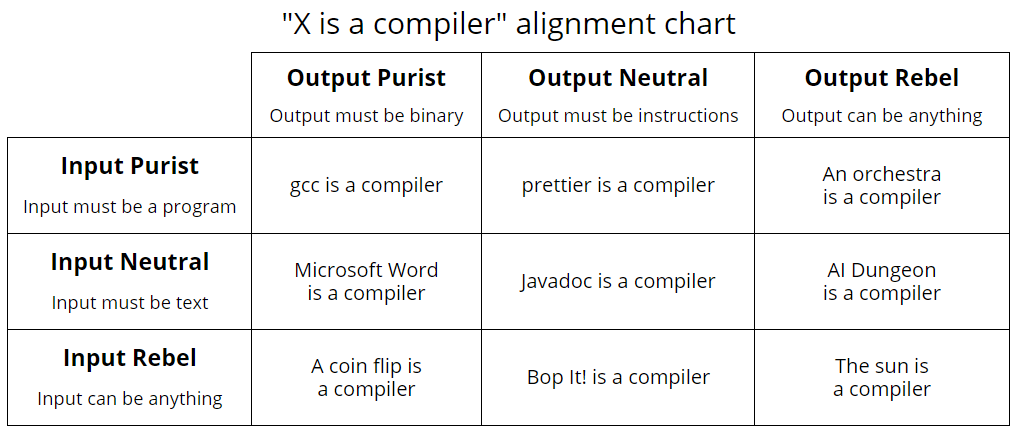CS 5220
Applications of Parallel Computers
Mixed languages, libraries, frameworks
Prof David Bindel
Please click the play button below.
Grumpy Old Man Warning!
- Lots of opinions ahead
- I can be wrong!
I have said…
- Use libraries! And frameworks! And tools!
- Use high-level languages (Lua, Python)!
- Lots of cool new tools! UPC++, SYCL, …
- Languages evolve, prefer modern C/C++/Fortran/Python
- You just need to tweak the
Makefile.infiles
Why Johnny Can’t Build
- Libraries aren’t installed
- How do I call Fortran from C++?
- How do I build with Lua, Python, etc?
- What about accelerators?
- How do I link everything?
Today
- Tool pragmatics
- Languages: big and little
- Some major frameworks
What is a compiler?
C/Fortran build flow
- Compiler maps source to assembly
- Or to something else
- Assembler maps to object files
- Librarian produces
- Static *archives (
.a) - Dynamic libraries (
.dylib) / shared objects (.so)
- Static *archives (
- Linker combines objects, resolves symbols
- Loader brings executables into memory
Compilation issues
- Language issues
- Old compiler? (common, alas)
- Specific extensions?
- Missing header files?
Assembler issues?
AARGH! (but not so common)
Static linker issues?
- Problems with name mangling
- Know:
extern "C"andiso_c_binding
- Know:
- Can’t find libraries?
- Esp language support libraries
Dynamic linking issues?
- Dynamic libraries resolve at load time
- Need to have them on search paths!
- Classic problem: “DLL hell”
- Versioning on libraries helps
- Still can run into issues
Building
- Lowest: compile/link
- Next: Makefiles
- Next: CMake/autoconf/etc
- Use package managers if possible!
Autoconf
configure; make; make install- Behind the scenes: shell scripts and M4
- Finds libraries / platform specifics
- Generates build system for you
CMake
- Commercial tool (Kitware)
- Pay for documentation
- Configure and build all in one
- Improvement on autotools?
Package managers
- Common on single node
- Linux: apt, yum
- MacOS: brew, macports
- Cross: conda
- Spack, EasyBuild
- Support environment modules
- Allow multiple build toolchains
A step back
The mountain of abstraction
Consider class trajectory:
- Started very low-level
- Up to general ideas/kernels
- Up to parallel concepts, applications
- Nirvana: performance “just happens”?
Low-level frameworks and languages
- OpenMP and MPI
- Intel TBB
- Global arays
- Newer(?) parallel languages, extensions
Libraries
One thing (or a few) done fast:
- BLAS (MKL, OpenBLAS, ATLAS, etc)
- LAPACK and successors
- FFTW
- Sparse direct solvers
Key challenge: linking (esp across languages)
Framework libraries
- Many in PDE land
- PETSc, SLEPc, TAO, etc
- Trilinos
- Overture
- deal.ii
- More complicated interfaces
- Effectively defines embedded solver lang
Framework libraries
Renaissance thanks to ML!
- TensorFlow, PyTorch, JAX, etc
- Often define embedded DSLs
- Build expression in Python, etc
- Separate compile/optimize/execute
Scripting languages and PSEs
- MATLAB, Octave, R, Python, Julia
- “High productivity” vs “high performance”?
- Not necessarily slow! Extensions, libs, JIT
- Performance strategies transfer
- Bottlenecks may not be where you expect
Domain specific languages
Great opportunities from limited scope!
- Classic example: SQL
- PDE domain: finite element compilers
- Dolfin framework
- Sundance
- Embedded languages/specializers
- Modern: SimIt, GraphIt, Halide, etc
Simulation codes
- Typical pattern
- Cusom lang/preproc for problem input
- Scripting language to describe analysis
- User-defined elements/modules in compiled lang
- Great for some classes of problems
- Can be torturned into covering other types!
Role of scripting languages
- Often interpreted
- Great for “high-level”
- Python is the default (or Lua?)
- Interface with C/Fortran for perf
Issues in mixing languages
- How do languages communicate?
- How are extensions compiled/linked?
- What support libraries are needed?
- Who owns main loop?
- Who owns program objects?
- How are exceptions handled?
Cross-language calls?
- Via pipes (pre-/post-processors)
- Inter-process communication
- Remote procedure call
- Linked together (with wrapper gen?)
Mixed language: tech issues
Primary pain points:
- Cross-language communication
- Building and deployment
- Debugging and run-time issues
Mixed language: social issues
- Availability of docs
- Availability of tools/libraries
- Active user base
- Open-ness of code base?
- Longevity
Best advice
- Conservative re general-purpose lang
- (Modern) C++ and Fortran
- Otherwise, look for C-compatible calling
- Python on top
- More adventurous for DSLs
Also like Julia (yes, I’m inconsistent)
Concluding thought
I don’t know what the programming languge of the year 2000 will look like, but I know it will be called FORTRAN. – C.A.R. Hoare
